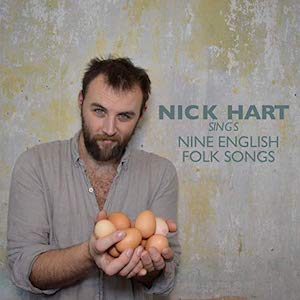 Nick Hart – Nick Hart Sings Nine English Folk Songs
Nick Hart – Nick Hart Sings Nine English Folk Songs
Roebuck Records – 1 May 2019
Nick Hart’s first solo album, Eight English Folk Songs, is a personal favourite and gets a regular play. Now here comes Nick Hart Sings Nine English Folk Songs, a collection mainly from, or connected with, East Anglia, his home patch. How does it stand up?
The variety of songs here are much more subtle when compared with the previous album. Eight had a clearer definition between tracks; on Nine, the differences of tempo and delivery demand more of a listen but then we get a better pay off. Additionally, bringing out one of my pet themes of the moment, his style does lend itself to letting the words tell the tale. Even the humour in The Molecatcher relies on the listener getting the joke, little or no hint from the singer.
Music is clearly something that has always been part of Nick’s makeup, from a disinterested childhood among his family of Morris dancers to a developing zeal for playing for ceilidhs and then being captured by the mid- to late-twentieth century recordings of traditional singers. It is this latter interest that we hear in his solo work, a variation in fact of continuing the oral tradition: if you cannot hear the singer live, then listen to their recording. Many of these earlier recordings were taken in the field and may have been first-takers whether the singer liked it or not.
Two songs learned in this manner, are from the repertoire of Walter Pardon, the Norfolk carpenter and one of AL Lloyd’s ‘finds’ when off hunting for English folksong: The Rakish Young Fellow and A Ship to Old England Came. In his notes in the album, Nick points out that the first verse on the Walter Pardon recording differs melodically to the subsequent ones and conjectures that it might have taken Walter that long to get settled into the song. No second takes in those days
Another tradition continued here – and one that occurs perhaps more often than we might appreciate – is the marrying of words to tunes, particularly when there are only the words to go on. The Lakes of Cold Finn, comes to this album via the words from John Burton of Clacton-on-Sea, and a tune of Geoff Ling’s from Blaxhall, Suffolk, even though the song is a traditional Irish Ballad.
Another lesson illustrated in this album is how many different titles a song may have and sometimes we don’t really know why – or how. John Riley, more commonly known as Lord Randall, has at least three other names and that’s not even considering the various spellings of Randall. If that’s not enough, in this cheery tale of poisoning, even the contents of the meal vary from version to version. Here Nick sings that the meal consists of eels, which, he says, is quite appropriate as this version was collected in Ely, once apparently surrounded by an exuberance of the slippery fish.
Of course, it is not just about the pedigree, the antecedents. The background is interesting, the continuation of tradition is important and the placing of the song is necessary, but these are just parts of the whole, the album, and it is the whole as the end result that matters. So, does it stand up? On this new album, we get more nuance: more nuance absorbed into his style and more nuance in the variation between songs. So yes, as good as the first, but different.
Nick has spent a long time honing his skills as an unaccompanied singer, a necessary pathway to get to this point. However, on these tracks, his guitar sparingly complements his own spare delivery, sometimes with the viola of Tom Moore, and the added vocals of Dominie Hooper. But it Nick’s effortless phrasing, the clarity and simplicity of the song, the voice, the guitar, that entrap the listener and pulls us into the timeless – then and now – world of the folk song. Excellent again.
You can order “Nick Hart Sings Nine English Folk Songs” via Bandcamp: https://nickhartmusic.bandcamp.com/album/nick-hart-sings-nine-english-folk-songs

